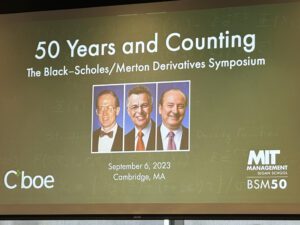I write about the nature of reality and the mechanics of perception. Last year, I spoke at MIT at an event honoring 50 years of Black-Scholes/Merton. My father, Fischer Black, co-authored a formula for pricing options that helped to birth modern finance. A life-long champion of free minds and free markets, my father’s motto was simple. Ask questions and think for yourself.
I have tried to follow his advice, and have been asking some audacious questions lately.
Does light have speed? Or does light have density? Perhaps it depends whom you ask. To an observer who is denser than light, it will appear to have speed. To an observer who is more diffuse than light, it will appear to have density. And to an observer with the same frame of reference, it has neither. Ice thinks water has speed. Vapor thinks water has density. Water knows water has neither.
This, in a nutshell, is what I said when I spoke at MIT: Perhaps we should shift our perspective, and try to see the world not as matter, but as information.
If the universe is a speeding train, what is matter? Matter is a way of seeing. Matter is the departing station. To matter, it appears as if the universe is accelerating and expanding. Energy is the arriving station. To energy, it appears as if the universe is decelerating and condensing. But in between these two, there is a third perspective: that of the train itself.
Could time be like this train—something that has speed, but its speed may be perceived in different ways—or not at all? And might the speed of time play a role in disease?
